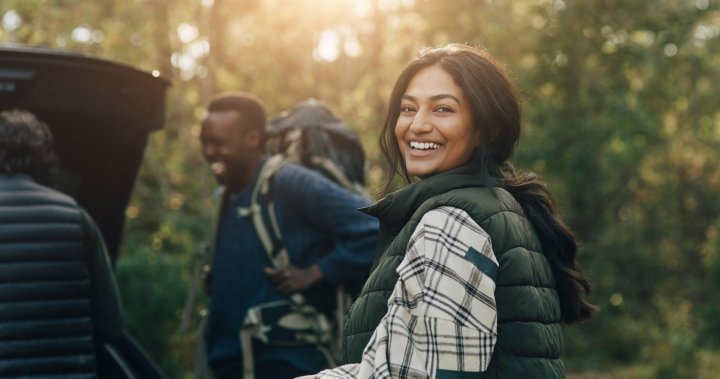As a second summer with COVID-19 restrictions approaches, many Canadians have been on the hunt for available outdoor bookings — from camping in national parks to alternative trips like glamping.
Back in February, Ontario Parks stated reservations for its campsites have nearly doubled since 2020, with bookings made between Jan. 1 and Feb. 5 increasing by almost 100 per cent.
In a statement to Global News, Parks Canada stated that it has experienced four consecutive years of record-setting demand for early reservations.
“Demand has been even higher this year, as Canadians look to get outdoors and stay closer to home for their vacation plans,” the statement reads.
Read more:
COVID-19: Parks Canada delays opening of Trent-Severn Waterway, most visitor services in Ontario
“A significant increase in the number of camping reservations for the months of July and August was observed throughout the Parks Canada network since reservations for the 2021 visitor season opened on April 1, 2021.”
Parks Canada also adds there is still camping availability at various locations and some of the most popular campgrounds to book are the Rocky Mountain National Parks, La Mauricie in Quebec, Prince Edward Island National Park, Riding Mountain in Manitoba, and Prince Albert National Park in Saskatchewan.
With the future of the pandemic remaining uncertain and the novel coronavirus continuing to be a threat to provinces across the country, Parks Canada states it’s updating information as it comes, according to COVID-19 measures.
“Across the country, Parks Canada is following the advice and requirements of public health authorities and experts by implementing measures for cleaning at all places open for visitation,” they stated.
“Only those places where measures can be implemented to minimize health and safety risks are open to the public.”

With vaccines continuing to roll out and the prevalence of COVID-19 across communities, Dr. Anna Banerji, associate professor at the Temerty Faculty of Medicine in Toronto, emphasizes Canadians still need to remain vigilant.
When it comes to camping, Banerji says it depends on the situation and type of camping. Being outdoors is much safer than being inside, she says, adding Canadians can also rely on safety precautions like physical distancing and masks.
“If you’re having camps where you’re in a tent or you have one person in a unit or cabin, or a family in a unit or cabin, that’s a lot safer than having a whole bunch of different households in one cabin,” she says.
If there is more than one household in a cabin, Banerji says the chance of getting COVID-19 is much higher.
The next question families would have to ask themselves is if their kids are vaccinated, she says, adding if kids have at least one dose, it drastically reduces the risk of a potential outbreak.
Read more:
Future of Alberta summer camps up in the air as operators, families wait for word from the province
“Things that you could do are making sure that the kids are vaccinated, trying to have them outside, if they can have tents or single units,” she says.
“I think camps that don’t have kids that are vaccinated … that have multiple families staying in one unit … are at much higher risk of outbreaks.”
She adds if parents are thinking of overnight camps, they should try to get their kids vaccinated before they go.

“Part of what’s going to happen and not happen depends on if people are vaccinated or not,” she says.
“It’s better just to stick to your family unit. Who knows what’s going to happen in the future, but I think we still need to be vigilant until there are more kids vaccinated and the COVID numbers go down.”
When it comes to other outdoor activities for the summer, Banerji says everything from playing soccer outside to going to parks is possible (as long as local public health measures allow), as long as people continue to be cautious.
When it comes to alternatives to camping, Parks Canada states the network has a variety of programs and activities but “there may be limits on the number of participants or requirements to pre-register, and, some programs and activities may need minor changes to ensure the health and safety of participants and Parks Canada team members.”
Outside of bookings in national parks, Canadians have also looked to other local getaways like glamping sites, as well as treehouse and RV stays.
Rubin Martinez is the co-founder of Glamping Hub, a booking platform for glamping across North America.
Since starting the platform 12 years ago, Rubinez says the interest in glamping has been growing at a significant rate.
People who seek these stays are often looking to get out of the city but still remain close by, to disconnect and appreciate nature and to test being outdoors if they haven’t done traditional camping before, he says.
“Pre-COVID-19 there was already significant momentum and then obviously with COVID-19 it checked a lot of boxes for people,” says Rubinez, pointing to things like people seeking to travel locally and to avoid big crowds of people.
“Being able to drive up, two, three hours, and really rediscover their backyard has been huge over the last year.”
Rubinez adds that many glamping operators are anywhere between 85 percent to 100 per cent fully booked until October.
On why glamping spots have become successful, Rubinez says everything from location to biking and fishing spots as well as other accommodations like a kitchenette have been among the things that attract people.
Read more:
Ontario can only have ‘good summer’ if COVID-19 vaccines continue, some measures remain: officials
“It really is that direct access to Mother Nature, a certain level of comfort, and then a unique structure,” he says. “Ninety-nine per cent of the people who go for the first time say, ‘Why haven’t I been doing this all along?”
Rubinez adds other outdoor activities like secluded cabins, huts and RV stays continue to be popular alternatives year-round, including in winter when people can snowshoe or cross country ski.
So what are you waiting for? Time to get outside.
© 2021 Global News, a division of Corus Entertainment Inc.



